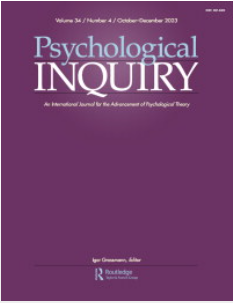Commentary on Gries, Muller and Jost’s “The Market for Belief Systems: A Formal Model of Ideological Choice”
IF 4.1
2区 心理学
Q1 PSYCHOLOGY, MULTIDISCIPLINARY
引用次数: 0
Abstract
In the wake of increasing political polarization in the American body politic, and the rise of populist and authoritarian leaders more generally around the world, there has been a great deal of renewed attention to the nature and function of political ideology. Particularly in light of the recent insurrection in the U.S. Capitol on January 6th, 2021, and the precipitating and ensuing public debate surrounding the big lie espoused by many Republicans arguing that Trump won the 2020 election, political pundits and academics are increasingly asking how we can make politics less polarized and conflictual. The subtext in much of this discussion revolves around how best to persuade people to change their ideology to allow the possibility for greater political and social compromise. Into this fraught public and academic debate, Greis et al. offer a formalized model of ideological choice drawing on methods from economics in an effort to increase our understanding of how people decide which ideologies are best suited to their psychological and consumption needs, couched in terms of both supply and demand. This approach strives to combine psychological factors as well as economic principles to create a cohesive model of choice. In this way, Greis et al. explicitly approach the problem of how people select an ideology as a problem of decision making under conditions of uncertainty. This draws upon, and expands, earlier theoretical and empirical work by Jost and colleagues (Jost, Federico, & Napier, 2009; Jost, Glaser, Kruglanski, & Sulloway, 2003; Jost, van der Linden, Panagopoulos, & Hardin, 2018) that explored the effects of uncertainty on the development of conservative political beliefs in particular. There is much to applaud about this paper. As with any formal model, the challenge, of course, lies in the empirical accuracy of the assumptions posited. These challenges, to employ the authors’ categories, fall into both demand and supply side categories. What is noteworthy in the current model is not so much what is included as what is left out. Notably, much of this model seems readily applicable to the recent Trump phenomena, but it remains unclear how well it generalizes beyond seeking to explain the nature of his support. Finally, it is worth considering at least one obvious addition, if not alternative, to the nature of ideological choice that derives from the critical nature of community for both physical and emotional survival. This consideration can be incorporated in light of a different weighting for multi attribute choice. This brief commentary proceeds along these lines.评Gries、Muller和Jost的《信仰体系的市场:意识形态选择的形式模型》
随着美国政治体制中政治两极分化的加剧,以及民粹主义和威权主义领导人在世界各地的崛起,人们重新关注政治意识形态的性质和功能。特别是考虑到最近2021年1月6日美国国会大厦发生的暴动,以及围绕许多共和党人所支持的特朗普赢得2020年大选的弥天大谎而引发的公众辩论,政治专家和学者越来越多地问我们如何才能使政治不那么两极分化和矛盾。这场讨论的潜台词大多围绕着如何最好地说服人们改变他们的意识形态,从而有可能实现更大的政治和社会妥协。在这场令人担忧的公众和学术辩论中,Greis等人借鉴经济学的方法,提供了一个意识形态选择的形式化模型,以增进我们对人们如何决定哪些意识形态最适合他们的心理和消费需求的理解,从供应和需求的角度来表达。这种方法努力将心理因素和经济原则相结合,以创建一个有凝聚力的选择模型。通过这种方式,Greis等人明确地将人们如何选择意识形态的问题视为不确定性条件下的决策问题。这借鉴并扩展了Jost及其同事早期的理论和实证工作(Jost,Federico,&Napier,2009;Jost,Glaser,Kruglanski,&Sulloway,2003;Jost、van der Linden、Panagopoulos和Hardin,2018),这些工作特别探讨了不确定性对保守政治信仰发展的影响。这篇论文值得称赞。当然,与任何形式的模型一样,挑战在于假设的实证准确性。根据作者的分类,这些挑战分为需求和供应两类。当前模型中值得注意的与其说是包含了什么,不如说是遗漏了什么。值得注意的是,这个模型的大部分似乎很容易适用于最近的特朗普现象,但除了试图解释他的支持性质之外,它的推广效果如何尚不清楚。最后,值得考虑的是,意识形态选择的本质至少有一个明显的补充,如果不是替代的话,那就是社区对身体和情感生存的批判性。这种考虑可以结合用于多属性选择的不同权重。本简短评论是沿着这些思路进行的。
本文章由计算机程序翻译,如有差异,请以英文原文为准。
求助全文
约1分钟内获得全文
求助全文
来源期刊

Psychological Inquiry
PSYCHOLOGY, MULTIDISCIPLINARY-
CiteScore
10.30
自引率
1.10%
发文量
31
期刊介绍:
Psychological Inquiry serves as an international journal dedicated to the advancement of psychological theory. Each edition features an extensive target article exploring a controversial or provocative topic, accompanied by peer commentaries and a response from the target author(s). Proposals for target articles must be submitted using the Target Article Proposal Form, and only approved proposals undergo peer review by at least three reviewers. Authors are invited to submit their full articles after the proposal has received approval from the Editor.
 求助内容:
求助内容: 应助结果提醒方式:
应助结果提醒方式:


